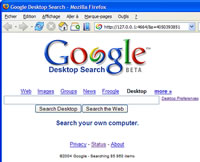 Google, a name synonymous with Internet searching, is now permeating the desktop. Currently it’s the PC (i.e. Windows environment) they’re moving into, but Apple Macs and even Linux are the likely next moves.
Google, a name synonymous with Internet searching, is now permeating the desktop. Currently it’s the PC (i.e. Windows environment) they’re moving into, but Apple Macs and even Linux are the likely next moves.
Microsoft (MS) has traditionally owned the operating system (OS) and many of the applications, but Google’s new tools allow searching in that space without having to directly access any of the aging empire’s software directly.
Google Desktop Search
The newest version (2) has the option of a sidebar or deskbar and searches can be entered directly into these. It also installs a search bar into Outlook. It’s possible to directly search items using these without ever going through the Windows “Start” menu. Whereas MS has had tools such as Lookout (actually produced by another company, which MS bought) which allowed searching in Outlook, it’s no longer needed as Google does a better job and searches more file types.
There are potential privacy concerns as Google will search Email, Chats, Web history, Media files, Text, Word, Excel, PowerPoint, PDF, Contacts, Calendar, Tasks, Notes, Journal and other files and send relevant info back to Google, however that can be turned off.
Once Desktop is started it sits there a while locally indexing the info and then searches are very fast, new files are indexed as they are created or arrive etc. 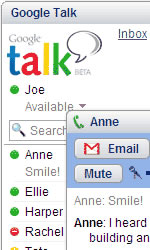 Google Talk
Google Talk
Though Google Desktop (ableit in an more limited form) has been around for a while, Google Talk is new and is their take on the Instant Messaging world.
The client is quite basic, it currently supports simple chat and voice. You need a Google Mail login to use the service (GMail accounts now support 2.5GB as standard) and it can check your GMail inbox. Chats can now be logged into the Google Mail system.
The voice quality is superb, Google have licensed some pretty good codecs (the software that translates analogue voice into digital form or vice versa) and it’s as good as Skype if not better.
Google Talk actually uses the XMPP open protocol (better known as Jabber) so any Jabber client can be used with Google’s server (including Gaim for various platforms and Apple’s iChat for Macs), though voice functionality is currently only available with their own client. However, that’s about to change as Google have released ‘libjingle’ a programming library which implements their voice services so others can incorporate them into their IM clients.
Jabber allows server connectivity to other networks and sure enough Google have just enabled this feature, so Google users can chat with Jabber users on other Jabber networks (if the other network connects).
Since the client is only v1, new functionality will be added as time passes, one can only wonder what but it’s likely they’ll be some form of search capabilities, maybe even adwords based on the conversations that are taking place.
Jabber itself has a lot more to offer itself, like conference rooms, which Google are sure to implement.
 Google Mail
Google Mail
Another service that’s been around for a while (and again sparked heated privacy debates) Google Mail or GMail now offers 2.5GB of mail storage. The premise is you never delete mail, but just keep everything. All mail arrives in your INBOX, but then it can be sorted using various criteria and moved to various folders.
This concept isn’t new, DEC (Digital Equipment Corporation, now long gone) had this idea with their Altavista mail service, whereby all mail arrived in your INBOX and the client just put everything in the right place. Google just got it right and made it a Web service.
Some people will use all their space, but many struggle to use even a small percentage of it. An enterprising developer has made an application that allows Windows XP users to utilise it as a remote file store with drag and drop capabilities. There’s no guarantee it will keep working as Google can alter their systems at anytime. There’s a link at the end of the article.
Part two of this article will be out tomorrow.
 Back on Tuesday Google released their latest offering, the Google Web Toolkit (GWT). For those who didn’t catch the news at the time, it’s a downloadable application that lets developers write Java code that is translated into Javascript.
Back on Tuesday Google released their latest offering, the Google Web Toolkit (GWT). For those who didn’t catch the news at the time, it’s a downloadable application that lets developers write Java code that is translated into Javascript. The interface – Now they’re ready to box
The interface – Now they’re ready to box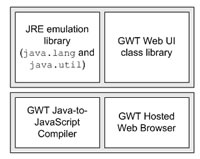 Summary I’ll leave you with the key point – Google Web Toolkit gives people the tools (literally) to write applications that work in any Web browser, circumvent Microsoft’s crown jewels, the Windows interface.
Summary I’ll leave you with the key point – Google Web Toolkit gives people the tools (literally) to write applications that work in any Web browser, circumvent Microsoft’s crown jewels, the Windows interface. Nordic mobile goliaths Nokia have unveiled an upgrade for their Nokia 770 Internet Tablet which gives the chunky device VoIP and instant messaging capabilities through Google Talk.
Nordic mobile goliaths Nokia have unveiled an upgrade for their Nokia 770 Internet Tablet which gives the chunky device VoIP and instant messaging capabilities through Google Talk. Sales weren’t too hot though, but Nokia reckon that by bolting on VoIP phone capabilities they can turbo charge unit-shifting, with Virtanen insisting that internet telephony is “the key for us to reach higher sales volumes.”
Sales weren’t too hot though, but Nokia reckon that by bolting on VoIP phone capabilities they can turbo charge unit-shifting, with Virtanen insisting that internet telephony is “the key for us to reach higher sales volumes.” The updated OS also boasts enhanced text typing with full-screen finger keyboard, improved memory performance and a ‘refreshed’ look (did they throw a bucket of water at it, or something?).
The updated OS also boasts enhanced text typing with full-screen finger keyboard, improved memory performance and a ‘refreshed’ look (did they throw a bucket of water at it, or something?).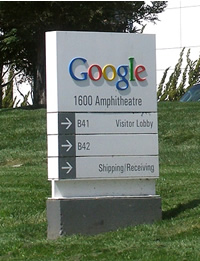 Google took the opportunity of their annual press briefing at the Googleplex to inform the assembled hacks of four new applications. The theme they were trying to push was ‘honest we _are_ a search company.”
Google took the opportunity of their annual press briefing at the Googleplex to inform the assembled hacks of four new applications. The theme they were trying to push was ‘honest we _are_ a search company.” There’s also a feature to compare two search terms, our favourite so far being
There’s also a feature to compare two search terms, our favourite so far being  Search giant Google has announced a free, Web-based ‘shareable’ calendar service called, appropriately enough, Google Calendar, which allows users to post up events and share them with others.
Search giant Google has announced a free, Web-based ‘shareable’ calendar service called, appropriately enough, Google Calendar, which allows users to post up events and share them with others. Gmail Integration
Gmail Integration Based on open calendar standards, events can be imported from popular programs like Microsoft Outlook and Apple iCal, while schedules can be viewed by any external application or device that accepts iCal or XML files.
Based on open calendar standards, events can be imported from popular programs like Microsoft Outlook and Apple iCal, while schedules can be viewed by any external application or device that accepts iCal or XML files. Google is launching an upgrade to its toolbar for Mozilla’s Firefox browser, adding enhancements to the search box and an antiphishing feature.
Google is launching an upgrade to its toolbar for Mozilla’s Firefox browser, adding enhancements to the search box and an antiphishing feature. Gmail users should like the new feature that opens mailto: links on webpages straight into a compose window in Gmail – no need to copy and paste emails off Webpages.
Gmail users should like the new feature that opens mailto: links on webpages straight into a compose window in Gmail – no need to copy and paste emails off Webpages. After reporting Google’s
After reporting Google’s  Merrill Lynch analyst Lauren Fine predicted that, “Google’s increased market share and better monetisation of queries will lead to an increased share of ad dollars relative to competitors in the first half of this year.”
Merrill Lynch analyst Lauren Fine predicted that, “Google’s increased market share and better monetisation of queries will lead to an increased share of ad dollars relative to competitors in the first half of this year.” With a leather-gloved stroke of the company white cat, Google’s mastermind cackled loudly as new figures revealed that their plans for UK domination are nearly complete, with almost three out of every four searches in the UK using their search engine.
With a leather-gloved stroke of the company white cat, Google’s mastermind cackled loudly as new figures revealed that their plans for UK domination are nearly complete, with almost three out of every four searches in the UK using their search engine. It looks like the Brits have taken a particular shine to the San Francisco-based search giant, with February’s search referral stats outperforming Google’s US average for the the month (55.39 percent) and their global average (62.4 percent).
It looks like the Brits have taken a particular shine to the San Francisco-based search giant, with February’s search referral stats outperforming Google’s US average for the the month (55.39 percent) and their global average (62.4 percent). Like Dr Strangelove with a modem, Google has made another stride in its plans to take over the virtual world, with a new Google Finance service announced today.
Like Dr Strangelove with a modem, Google has made another stride in its plans to take over the virtual world, with a new Google Finance service announced today. There’ll also be a broad range of company news and information, an interactive chart correlating news and other events with stock price spikes and falls, delivered in a “clean, uncluttered user interface.”
There’ll also be a broad range of company news and information, an interactive chart correlating news and other events with stock price spikes and falls, delivered in a “clean, uncluttered user interface.” Google Finance also provides a personalised area for keeping track of stock quotes for selected companies along with any related news.
Google Finance also provides a personalised area for keeping track of stock quotes for selected companies along with any related news. Suppose you ran a Web site, and got a little money in advertising. And then suppose someone came along, and said: “I can give you more readers, and extra advertising!” – would you be grateful? Especially if this was genuine, and tested out? Well,
Suppose you ran a Web site, and got a little money in advertising. And then suppose someone came along, and said: “I can give you more readers, and extra advertising!” – would you be grateful? Especially if this was genuine, and tested out? Well, 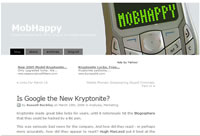 The Kryptonite comparison, summary: inhabitants of the InterWeb Blogland discovered you could steal a bike locked with Kryptonite even if all you had was a ball point pen, and Kryptonite dismissed those quaint Bloglanders as irrelevant. Well, yes; if you sell a product which is shown to be non-functional, you need to deal with the bad press.
The Kryptonite comparison, summary: inhabitants of the InterWeb Blogland discovered you could steal a bike locked with Kryptonite even if all you had was a ball point pen, and Kryptonite dismissed those quaint Bloglanders as irrelevant. Well, yes; if you sell a product which is shown to be non-functional, you need to deal with the bad press.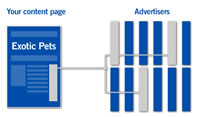 Now, I can see Google’s point. “What is this guy’s problem?” you might say. After all, most adverts on Web pages are there without the explicit consent of the site manager. One-click and other advert providers post adverts “on the fly” and track the individual user. Click on one advert for fast cars, and they’ll probably show you more next time you visit; and they don’t ring up the Web site manager and ask specific permission. They just download the advert. (Eventually. When you’re almost out of patience, and thinking of switching to Firefox and running Adblock. Another story…)
Now, I can see Google’s point. “What is this guy’s problem?” you might say. After all, most adverts on Web pages are there without the explicit consent of the site manager. One-click and other advert providers post adverts “on the fly” and track the individual user. Click on one advert for fast cars, and they’ll probably show you more next time you visit; and they don’t ring up the Web site manager and ask specific permission. They just download the advert. (Eventually. When you’re almost out of patience, and thinking of switching to Firefox and running Adblock. Another story…)